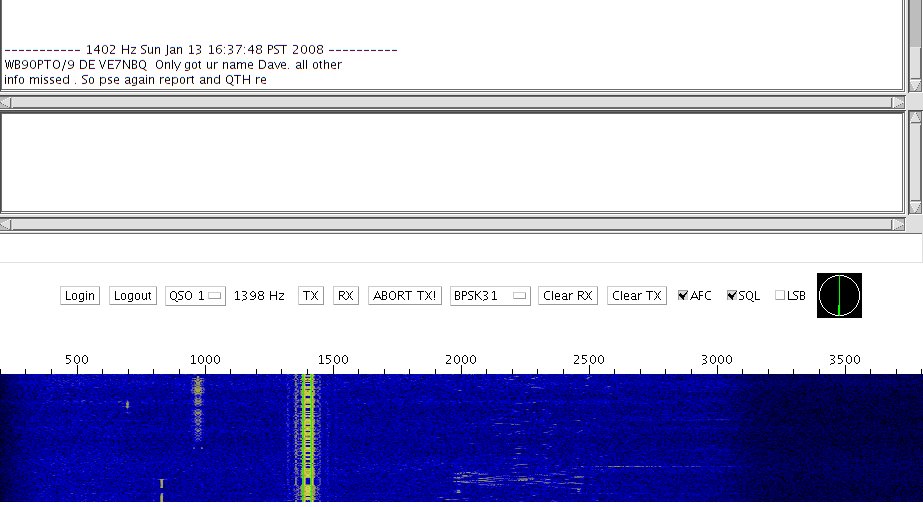znidig and RPSK are a pair of programs for ham digimode use. They are both written in Java, and are available as open source under the GPL license.
$ ./znudigi --list [Listing devices] [Device 0: system [plughw:0,0]] [Device 1: nForce2 [plughw:1,0]] [Device 2: nForce2 [plughw:1,1]] [Device 3: nForce2 [plughw:1,2]] [Device 4: Java Sound Audio Engine] [Device 5: Port system [hw:0]] [Device 6: Port nForce2 [hw:1]] $ ./znudigi [Trying all sound devices in numeric order.] [Trying device 0] [Trying system [plughw:0,0] PCM_SIGNED 8000.0 Hz, 16 bit, mono, 2 bytes/frame, little-endian] [Using device 0] [Listening on network ServerSocket[addr=0.0.0.0/0.0.0.0,port=0,localport=3125]] Got Socket[addr=/127.0.0.1,port=50808,localport=3125] Received connection from Socket[addr=/127.0.0.1,port=50808,localport=3125]

znudigi is a network digimode server, written entirely in Java. Besides being written in Java, znudigi in unique in that it offers absolutely no user interface; it is entirely a library of code and a threaded network stack which provides its services to clients, which themselves offer the user interface.
The second program is RPSK, which is a network-based UI for znudigi. RPSK is an incremental release over the RPSK program I developed in 2004.
znudigi isn't intended to require RPSK. I hope that, as the
protocol is more fully developed, there will be clients in other
environments
such as Flash, JavaScript, and C++/C#; plus non-traditional uses
such as PSKMail, Chess programs, and other ways for amateurs to
experiment with digital mode transport.
Both programs are small: znudigi is well under 100KB, and RPSK is under 50KB.
RPSK has been available since 2004, but supported only by patches to existing digimode programs. znudigi is in "pre-release." It supports receive of PSK31 and spectrum display only, and is not likely to be interesting to any users of any existing digimode program.
I have three reasons for writing a new one digimode program:
To try out znudigi, fetch the two programs and untar or unzip them, and follow the README instructions for starting each. Both programs are available with full source, but the pre-compiled JAR files are available in the downoaded as well. Both are available as identical packages in both .tar.gz and .zip files:
znudigi requires JDK 6, available from
Choose "JDK 6 Update 4" for compilation or the smaller "Java Runtime Environment (JRE) 6 Update 4" if you just want to run the pre-compiled versions.
Please check the file TODO in the znudigi package for issues.
znudigi is presently receive only.
znudigi is released under GPL license. I have incorporated code from gMFSK, fldigi, and PocketDigi. In doing so, I may have used ideas, algorithms, or code which you previously developed. Please check the AUTHORS file to see if I've properly credited your previously-released GPL code. I've tried to cite everything in the authors file, but I may have overlooked something.
73 es TNX,